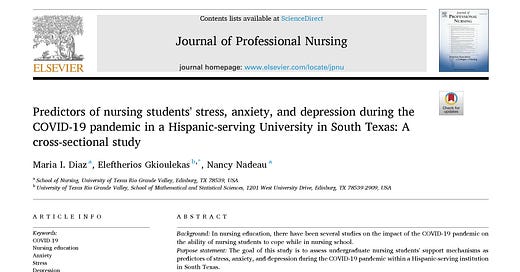New study on the predictors of stress, anxiety, and depression in undergraduate nursing students during the COVID-19 pandemic
I am pleased to announce the publication of our new study in the Journal of Professional Nursing, titled "Predictors of nursing students' stress, anxiety, and depression during the COVID-19 pandemic in a Hispanic-serving University in South Texas: a cross-sectional study", co-authored with my colleagues, Dr. Maria Diaz and Ms. Nancy Nadeau. The study is unfortunately behind a paywall; however, the publisher has provided us with a temporary link allowing access to the published article for a limited period of time. Furthermore, the accepted version of the article is available from my website, and one may also access our preprint.
This was a cross-sectional study investigating the predictors of stress, anxiety, and depression in undergraduate nursing students during the COVID-19 pandemic, who were predominantly Hispanic. The study confirmed that reduced stress, anxiety, and depression was predicted by increased resilience and spiritual well-being, also found by several prior studies such as Kim and colleagues. The study also found that decreased stress and depression was predicted by improved family functioning. However, several possible predictor variables were investigated, and some interesting findings emerged: (1) Experiencing and overcoming a COVID-19 infection was a predictor of increased stress; (2) having a father born in the United States was a weak predictor for decreased stress; (3) working as a salaried worker in a healthcare facility was a predictor for reduced anxiety and depression. Furthermore, although faculty support was correlated with reduced stress, it was not a predictor for reduced stress, anxiety, or depression after adjusting for other variables. However, we reviewed another study by Stubin and colleagues, where the prevalence of nursing students with severe or extremely severe stress, anxiety, and depression was much higher than in our study, in which psychological faculty support was found to be a predictor for reduced stress.
The paper includes an extensive review and comparison of our results with other studies. We also review strategies that can be used to help nursing students navigate through the difficulties that may emerge again in the event of a future pandemic crisis.
This was hardly a controversial study, so we did not have too much difficulty placing it in a top-level journal, but we did have two rejections along the way from other journals. Many thanks to the reviewers and especially the editor of the Journal of Professional Nursing who provided an abundance of helpful feedback and suggestions for improving the presentation of our results. It was quite an interesting learning experience to go through that process, and helpful to me for future work.
References
1. M. Diaz, E. Gkioulekas, N. Nadeau: "Predictors of nursing students' stress, anxiety, and depression during the COVID-19 pandemic in a Hispanic-serving University in South Texas: a cross-sectional study", Journal of Professional Nursing 58 (2025), 17-30
2. S.C. Kim, C. Sloan, A. Montejano, C. Quiban, "Impacts of Coping Mechanisms on Nursing Students' Mental Health during COVID-19 Lockdown: A Cross-Sectional Survey", Nursing Reports 11 (2021) 36-44.
3. C.A. Stubin, L. Ruth-Sahd, T.A. Dahan, "Promoting Nursing Student Mental Health Wellness: The Impact of Resilience-Building and Faculty Support", Nurse Educator 49(3) (2024), 119-124




